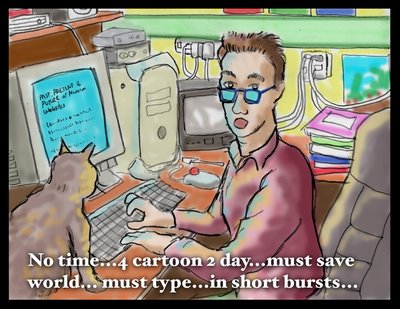WEEK EIGHT: IN THE SWAMP

As soon as I read Dan Gillmor’s wonderful phrase “Cyberswamp,” I knew what my cartoon this week would be about. In chapter five of “We the Media,” Gillmor talks about the anarchy of information and problems of trust that have unfortunately resulted from the wonderful freedom of communication afforded us by digital technology and the Internet. He shows how the ease with which we can cut and paste information can lead to words being taken seriously out of context. He points out the dangers inherent in our ability to alter images in Photoshop and other image programs. He gives examples of businesses and political factions that have taken advantage the anonymity of the Web to smear competitors or spread rumors in order to sway public opinion. He points to a public relations firm that actually advertises “online word-of-mouth marketing” among the services it offers.
Gillmor says rightly that in this new digital era we need to become active users, not merely passive consumers of information and news. This is a little depressing to those of us who thought that technology was going to make our lives easier, rather than creating more work for us. We need to take information “with a grain of salt,” Gillmor says, and most importantly, we need to consider the source of information to determine if it is reputable and free from ulterior motives.
Gillmor’s advice is correct, but my fear is that we are turning into a society in which people feel they can’t completely trust anything. I’ve run into people who feel like this already, especially about politics. I remember one very frustrating conversation I had with a young man who responded to every point I made with questions like, “What’s your source for that? How do you know he really said that? Were you actually there when he said it?” He believed that any video, audio or written record can be faked and therefore you can’t believe anything unless you have first hand experience of it. After a while I realized it was impossible to have a serious conversation with this person, just as it is with a child who asks “why?” about everything you say.
Attitudes like this are more than just frustrating; they are dangerous, because an atmosphere of doubt stifles progress, tends to support the status quo and shifts decision-making away from reason and toward emotion, wishful thinking and self-interest. For years the tobacco companies had basically just one response to all the mounting evidence about their products’ health risks: “There is no conclusive proof.” That one phrase introduced enough doubt, in many people’s minds, to blow away all the evidence. The exact same thing is happening today with the American attitude toward global warming. All George Bush has to say is “the jury’s still out,” and for many people the whole subject goes away.
There was a time when Walter Cronkite was known as “The Most Trusted Man in America.” Where is our Walter Cronkite today? If anyone has come close to this title recently, it would probably be Rush Limbaugh, but we would also have to give him the title “Least Trusted Man in America” at the same time. I’m starting to doubt that we’ll ever trust anyone the way we trusted people in the past.
I applaud organizations like Media Matters.org who strive to be watchdogs over the media. We need more organizations like these to help us sift through the masses of information, disinformation, spin and opinion that confront us every day. Perhaps some day even major news organizations will see this as their role (once again), instead of seeing it as providing entertainment, selling advertising or supporting corporate agendas. Perhaps the really big winners in the new information market will be those who figure out ways to guide us through the Cyberswamp and win our lasting trust.



